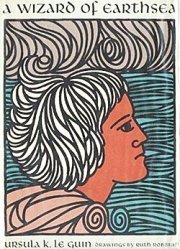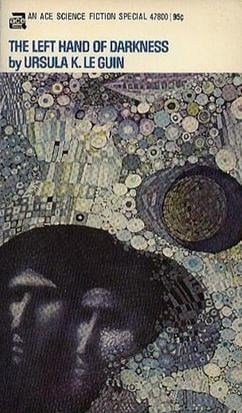Legendary speculative fiction writer Ursula K. Le Guin's career spanned sixty decades, twenty novels, hundreds of short stories, and poems, literary criticism, and translations. She won eight Hugo Awards and six Nebula awards and was nominated numerous times for each. She won five Locus Awards and the National Book Award. Her astounding legacy has inspired both readers and writers for generations. She is widely considered one of the most essential science fiction writers ever.
 Le Guin was born in Berkley, California, in 1929. She had access to a wide range of books at an early age due to her parents’ (an anthropologist and writer, respectively) large personal library. Some of her favorite reading materials were science fiction magazines Thrilling Wonder Stories and Astounding Science Fiction.
Le Guin was born in Berkley, California, in 1929. She had access to a wide range of books at an early age due to her parents’ (an anthropologist and writer, respectively) large personal library. Some of her favorite reading materials were science fiction magazines Thrilling Wonder Stories and Astounding Science Fiction.
Le Guin began writing at an early age and even submitted a story to a magazine when she was nine. The story was rejected, and she did not submit work again for nearly a decade. She began publishing works professionally, starting with poems and short stories in 1959. These works failed to garner much critical attention, and even her first novel, Rocannon, was released with little fanfare, as were subsequent books in her Hainish series.
It wasn't until 1968, with the publication of The Wizard of Earthsea that her writing began to draw the attention of critics and readers alike. In 1971, with the publication of her fifth Hainish book, The Left Hand of Darkness, Le Guin finally began to see the accolades that would become a hallmark of her career. The Left Hand of Darkness won both the Hugo and the Nebula Awards, making her the first woman to win either award.
These two books are widely considered to be masterpieces of speculative fiction. Le Guin’s 1974 novel The Dispossessed earned her the Hugo and Nebula again, making her the first to win both awards twice. For sixty years, Le Guin continued to publish award-winning fiction until she died in 2018.
Recently, the Ursula K. Le Guin Trust announced the shortlist for the newly created Ursula K. Le Guin Fiction Prize for book-length works of imaginative fiction, an award sure to become a marker of some of the best science fiction and fantasy today. Join us as we take a look at quotes from some of Le Guin’s most enduring works in anticipation of the award announcement:
-
"We all have forests on our minds. Forests unexplored, unending. Each one of us gets lost in the forest, every night, alone." –The Wind’s Twelve Quarters
-
"From that time forth, he believed that the wise man is one who never sets himself apart from other living things, whether they have speech or not, and in later years, he strove long to learn what can be learned, in silence, from the eyes of animals, the flight of birds, the great slow gestures of trees." –The Wizard of Earthsea
-
"It is a terrible thing, this kindness that human beings do not lose. It is terrible because when we are finally naked in the dark and cold, it is all we have. We who are so rich and full of strength end up with that small change. We have nothing else to give." –The Left Hand of Darkness
-
 "The trouble is that we have a bad habit, encouraged by pedants and sophisticates, of considering happiness as something rather stupid. Only pain is intellectual, and only evil is interesting. This is the treason of the artist, a refusal to admit the banality of evil and the terrible boredom of pain." – "The Ones Who Walk Away From Omelas"
"The trouble is that we have a bad habit, encouraged by pedants and sophisticates, of considering happiness as something rather stupid. Only pain is intellectual, and only evil is interesting. This is the treason of the artist, a refusal to admit the banality of evil and the terrible boredom of pain." – "The Ones Who Walk Away From Omelas" -
"Things don't have purposes, as if the universe were a machine, where every part has a useful function. What's the function of a galaxy? I don't know if our life has a purpose, and I don't see that it matters. What does matter is that we're apart like a thread in a cloth or a grass blade in a field. It is, and we are. What we do is like wind blowing on the grass.” –The Lathe of Heaven
-
"We are all contingent. Resentment is foolish and ungenerous, and even anger is inadequate. I am a speck of light on the sea's surface, a glint from the evening star. I live in awe. If I never lived at all, I am a silent wing on the wind, a bodiless voice in the forest of Albania. I speak, but all I can say is: Go, go on." –Lavinia
-
"To see that your life is a story while you're in the middle of living it may help you live it well. It's unwise, though, to think you know how it's going to go or how it's going to end. That's to be known only when it's over. And even when it's over, even when it's somebody else's life, somebody who lived a hundred years ago, whose story I've heard told time and again, while I'm hearing it, I hope and fear as if I didn't know how it would end, and so I live the story, and it lives in me. That's as good a way as I know to outwit death. Stories are what death thinks he puts an end to. He can't understand that they end in him, but they don't end with him." –Gifts









